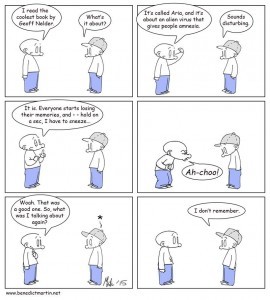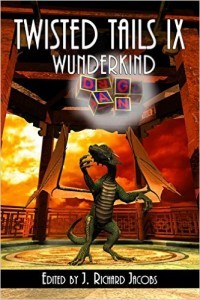Geoff Nelder's Blog, page 14
February 22, 2016
Win & when NOT to write scifi stories
When not to write science fiction 
Geoff Nelder’s guidance notes to short fiction competitors
These notes are the result in my being a short fiction judge in several competitions over the years including the Eros & Rust, and the Whittaker.
Introduction
Is there a hook in the first paragraph or two?
Is the hook a conflict that piques interest, or a setting intriguingly portrayed that makes me read on?
Are classic errors avoided? Eg Starting with unattributed dialogue, or starting with a dangling participle.
Do I smile in appreciation at a strong verb instead of a passive one?
Has a clever phrase set the scene or character already?
Character
It is encouraging that competitors take the marks and comments and use them to improve. What some may not appreciate is that a mark for characters for one of their stories may not be an exact match for the same effort on characterisation in another.
The mark depends on factors such as:
How the characters relate to the story as a whole.
Are the characters distinct in their behaviour, voice, appearance?
Does the character undergo a change in the course of the story?
Is the character interesting?
If the character is ‘nice’ does the writer go the extra mile necessary to make him or her convincing and worthy of the story?
Does the writer make me feel that I know the characters?
Do all the characters have a role in the story in that each moves the plot on?
If a character is a cliché (and many may have to be) is there some quirk or trait to lift him or her off the page?
It isn’t always necessary to describe a character, but is it well done if described? If not described is my own image consistent throughout the story?
Do the characters’ habits reinforce their image I’ve formed?
Do I care for the character?
Then there’s factor X. Don’t ask. I just have to feel for that one.
Inventiveness
This is mostly self-explanatory.
I look for novelty in all the other categories as well as in plotlines. Eg instead of a linear A+B+C+D is there B+A+C+D, etc? This isn’t essential and would need to be done well to avoid confusion.
If aspects of the piece are clichéd, is there a coruscating twist or quirkiness?
Am I surprised, laughing, shocked, weeping unexpectedly?
Factor X.
Voice 
These are some of the aspects of Voice that I look for in a story.
Has the narrator (via a character, set of characters, or rarely successful an omniscient POV) a distinctive wordcraft: a sensibility, attitude that flavours the piece?
Has the author avoided unwarranted narrative intrusion?
Is the attitude of the story, whether exuberant, miserable, edgy, warm, cold, angry, spooky, etc) convincing and appropriate?
Does the voice of each character, as shown by dialogue and behaviour, correspond with their roles, and work with the story as a whole?
Is active rather than passive voice used? In some cases passive is appropriate: such as to control pace.
Aspect of plot can influence the voice of a piece. For example a non-linear plot tends to be more interesting. On the other hand a linear one might be more appropriate if other aspects create a complex story.
Is the writing tight with no pleonasms (words that if removed leave the sense unchanged – this can include tautologies but not always – just, still, even, actually, that). Sometimes, rarely, a looser style is appropriate for the feel and pace of a story.
Is there good use of Show over Tell? Where appropriate, does the writer engage the reader’s senses such as smell, vision (including colours), sound in addition to dialogue, taste and touch? Avoided the dreaded nodding, shrugging, sighing?
Avoid weak modifiers such as slightly, almost, nearly – most adverbs too.
Is description just enough to stimulate the reader’s imagination and own experience, rather than so much it feels like a list?
Most stories need conflict and resolution. If not, is there intrigue or mystery to drive the reader?
Ending
Has the conflict in the hook been resolved?
If not, has a twist created a satisfying conclusion?
If a twist, does the whole story depend on it? – not a great idea.
Does the end leave the reader with a warm glow, or annoyed?
Endings do not have to explain everything, and could create more questions than answers.
Has the main character(s) undergone a change revealed in the latter part of the piece?
Technical
Has the writer adhered to the submission guidelines (see below)?
SPAG – Spelling and Grammar. American or GB English accepted.
Typos.
Plot / character errors – eg Jane becomes Janet, or changes physical appearance with no reason. A character killed on page one is alive on page three yet it isn’t a horror / fantasy.
Research
Many fiction competitors research to discover the judges’ likes and loathings. Do they hate stories written in the first person, present tense? If so write something in third person past instead. That makes sense as long as time spent on research and modifications doesn’t warp the writer’s creativity. It is unwise to seek out a judge’s favourite genre and craft a story in that genre unless the writer is very familiar with it. Because several competitors discovered that I write science fiction I had to grade a splattering of flying saucer and alien abduction stories, most of which yelled, ‘Amateurish!’ compared with those writers’ normal genre.
NOTE: These are pointers rather than a rigid check list and are used to add rigour to the subjectivity of grading fiction. An outstanding story could flout these points and still win.
I always smile at Ali Smith’s advice to Bridport Prize hopefuls: ‘I like a story to have a beginning, middle and end but not necessarily in that order.’
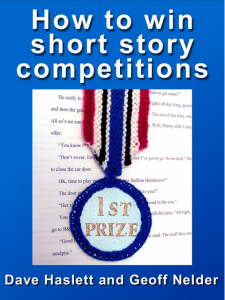 If you want to read more on how to win short story competitions you should grab a copy of that excellent booklet with that name by editors Dave Haslett and Geoff Nelder A pdf version is available from Ideas4Writers here.
If you want to read more on how to win short story competitions you should grab a copy of that excellent booklet with that name by editors Dave Haslett and Geoff Nelder A pdf version is available from Ideas4Writers here.
For UK Amazon Kindle
For US Kindle
Links to buy ARIA and other of my books are on my Amazon author page
Geoff’s UK Amazon author pagehttp://www.amazon.co.uk/Geoff-Nelder/e/B002BMB2XY
And for US readers http://www.amazon.com/Geoff-Nelder/e/B002BMB2XY
Geoff facebooks athttp://www.facebook.com/AriaTrilogy and tweets at @geoffnelder
The post Win & when NOT to write scifi stories appeared first on Geoff Nelder - Science Fiction Writer.
January 30, 2016
#Infectious #Alzheimer’s? I was here first

Viruses are pretty yet deadly
I should capitalise on the recent news but I’m not good at doing that. There’s a possibility that Alzheimer’s could be infectious. Up to now there has been no disease that creates infectious amnesia. Hence the original and unique premise of my ARIA (Alien Retrograde Infectious Amnesia) in which an alien virus is released on Earth. No immunity and everyone loses memory backwards at the rate of a year’s worth per week. As a writer I thoroughly enjoyed working out the ramifications, diffusion spread, possible mitigating actions and of course, WHY? It starts with ARIA: Left Luggage – see here for details
http://geoffnelder.com/project/left-l...
We always read of dementia and related memory loss as a tragedy and that could have happened in my ARIA series but as in the First world war trenches there is always a possibility of survival via humour, black humour, laughing in the face of adversity. That happens a lot in ARIA. Some people succumb to their amnesia much quicker that others and I’d like to think positive thinkers cope better.
One reader called ARIA: Left Luggage “a handbook for surviving such an apocalyptic event as infectious amnesia”. I presume she referred to the strategies employed by sufferers to minimise the effects – making notes on what was the MOST important thing they had to remember when they woke up. Medication, where weapons and car keys are, who they are married to or living with. Nothing like some humour in the book for when Manuel woke up to a strange woman every morning! And yet it was the amnesia …
Highlights:
ARIA is the first and so far only book to use the concept of infectious amnesia.
Although character-led, the novel has breakthrough plot threads, making us think of what is the most important and crucial aspects of our lives. Research help and support was emailed from space! Astronaut Leroy Chiao answered my questions about the nature of the struts on the International Space Station, and wished me luck with the book.
All the places on Earth used in the book are real geographical locations, including the ‘hidden’ valley – Anafon – in North Wales.
The cover art is designed by award-winning artist, Andy Bigwood.
The idea of infectious amnesia came while I was riding a bicycle up a steep Welsh hill.
You tube video trailer http://youtu.be/oh0AAXIe8VU
Facebook page for you to ‘like’ if you will http://www.facebook.com/AriaTrilogy
A wikia page about the ARIA Trilogy is at http://nelderaria.wikia.com/wiki/NelderAria_Wiki
Anyone wanting signed copies of any of the books please send me a message here in a comment or email geoffnelderATyahooDOTcom or message me on facebook.
Links to buy ARIA and other of my books are on my Amazon author page
Geoff’s UK Amazon author page http://www.amazon.co.uk/Geoff-Nelder/e/B002BMB2XY
And for US readers http://www.amazon.com/Geoff-Nelder/e/B002BMB2XY
Twitter @geoffnelder
My publisher LL-Publications tweets
Lust 4 #SciFi? Apocalyptic award-winning ARIA #kindle smarturl.it/1fexhs Medical mystery, #romance, apocalyptic, #survival & #hope ARIA is less than a cup of coffee.
http://www.sf-encyclopedia.com/entry/...
The post #Infectious #Alzheimer’s? I was here first appeared first on Geoff Nelder - Science Fiction Writer.
January 29, 2016
Planet Purgatory… a book group discussion
Last summer I read and reviewed Benedict Martin’s fantasy novel, Planet Purgatory and recommended it to the Chester Science Fiction and Fantasy Book Group for the January 2016 discussion meeting.
Below is my original review, followed by a report of the book group meeting with questions for author, Benedict Martin. He was kind enough to respond and his comments follow the questions. In fact, Benedict has other talents and one is revealed right at the end.
Planet Purgatory by Benedict Martin
Print Length: 176 pages
Publication Date: May 22, 2015
Sold by: Amazon Digital Services, Inc.
ASIN: B00Y5JCXP2
Reviewed by Geoff Nelder
Who isn’t fascinated by what happens when we die? Okay, quite a lot of people are in denial of the curious streak in them and don’t want to think of fate and their post-mortem if anything. Heaven, Hell, somewhere or something else? This is one of those cases where literature meets philosophy rather than science. Fantasy, yes, not science fiction but absorbing all the same for it is literally ‘out of this world’. Stories set more-or-less with the concept of purgatory can be found from the ancient Greeks, the Bible, Dante’s The Divine Comedy; to David Mitchell’s Cloud Atlas, and many contemporary novels use the concept of limbo to an intriguing effect. The first contemporary novel based on Purgatory that struck me as both ironically funny and thoughtful is Pit-Stop by Ben Larken. In that novel people in a roadside café find they cannot leave and conclude they are in a kind of limbo waiting for the Reaper to collect them – unless they can escape. I enjoyed that book so much I now compare it to stories based on that link between life and the after-life.
Planet Purgatory is easily worthy of such comparison. In this case one man suspects that he, his four-legged best friend and the people around are in Purgatory, while they believe they are colonists on an Earth-like planet. However, while in Pit-Stop the reader can believe totally in the story for a long time into the novel, in Planet Purgatory nothing suspends belief as much as a whale flying up out of the ground and landing on top of you. Brilliant. Much of the book is like a road trip written by the Grimm brothers in the setting of the filmAvalon. Yet, it isn’t all laughs – I hurt when the dog died. (or did it?) The imp is delightfully clever and intriguing who “…stared at me with an intensity that it was a wonder I didn’t burst into flames.”
So pleased to see a Rubik’s Cube involved in such a tale, however briefly. My brain has forgotten how to unscramble one but my fingers remember. This novel is rather like a Rubik’s Cube where ideas and people are scrambled but patterns form and the final page is the puzzle solved – so to speak.
Nothing is what it seems in Planet Purgatory, a morality tale at its most compelling grotesque. Highly commended.
Even if you have not read this excellent novel nor Pit-Stop I am intrigued what you think about limbo. Do you think it exists? If so what could it be like to impress you? Be fanciful!
Links:
Amazon link for Planet Purgatory:
http://www.amazon.com/Planet-Purgatory-Benedict-Martin-ebook/dp/B00Y5JCXP2/
and Ben Larken’s Pit-Stop
http://www.amazon.com/Pit-Stop-Special-Edition-Hollows-Book-ebook/dp/B00FS04K3A/
The QUESTIONS

Chester Library
Hello there Benedict,
Our Chester Science Fiction & Fantasy Book Group are a tough crowd with phenomenal memories of books they’ve read and films they’ve seen in the genre. With Planet Purgatory, all the six who turned up had read it and enjoyed it. It is rare for the group to unanimously agree on anything but they did on saying Planet Purgatory was entertaining with rich characters, some unique plot features and leaving them wanting more. All agreed that Flea is their favourite character.
What always impresses me with this group is the depth and detail with which they read books. Without referring to notes, although occasionally they tap on their Kindle app, they examined every character and plot nuance. Some of the group like to find hidden meanings (probably this is why they’ve not discussed any of my books in my presence!) in even the most obvious plots.
With respect to Planet Purgatory some of the group wonder that although they enjoyed the story and don’t mind too much the loose ends, they might have missed deeper meanings. For example the novel The Einstein Intersection by Sam Delany has the legend of Orpheus as its underlying theme. Some of our group want to know if you wrote Planet Purgatory with an underlying theme based on anything classical or otherwise?
Of course there is the theme of limbo and death. Limbo has not been experienced by any of us, so of course there’s a theme of the scary, bizarre and the unexplained. Perhaps the loose ends many of the group picked up is part of that feeling you wanted of weirdness. In fact one of our member wondered if PP was in the Weird sub-genre as practised by Jeff and Ann Vandermeer. In which case bizarro-type scenes with no explanations for their start and ending would be the norm.
The group mentioned many such unexplained elements but I can’t recall them all. One is the guards with metal plates over their faces – why? Exactly what is SYS? Who is Julius Winter? These things didn’t matter to me when I read Planet Purgatory – as a writer, I am good at just taking in the narrative as it is.
So, Benedict, just wondering if you have reader notes to go with Planet Purgatory? Once my ARIA came out I have given many talks at literary events and blog Q&A sessions so have developed answers to all kinds of questions and reactions to aspects of my novels that hadn’t occurred to me when writing them.
Cheers
Geoff
P.S.
In the 1960s I took A Level English Literature. It always amused me when the lecturer would tell us what the author REALLY meant! Now I sit in on some reader group sessions and hear people tell me what I meant when I made a certain scene or plot thread happen and yet that interpretation never occurred to me – haha. I am reminded of a quote by John Green when he said that once your story is published it no longer belongs to you but to the reader. So true.
 ANSWERS The story is meant to be strange. Without getting too deep or spiritual, I oftentimes look at life as a dream, and any afterlife to be simultaneously a continuation of that dream, but also a completely new dream, with new rules and new backstories. In this case, David is fumbling along, trying to learn and understand the rules of this new dream, like a newborn, only he has memories of his old life/dream to serve as unreliable guide on how things should proceed.
ANSWERS The story is meant to be strange. Without getting too deep or spiritual, I oftentimes look at life as a dream, and any afterlife to be simultaneously a continuation of that dream, but also a completely new dream, with new rules and new backstories. In this case, David is fumbling along, trying to learn and understand the rules of this new dream, like a newborn, only he has memories of his old life/dream to serve as unreliable guide on how things should proceed.
I’m a Christian, and while I went out of my way to keep it from being a ‘Christian’ story, or to try and teach any lessons, (I don’t like stories that teach) my faith definitely played a role at some level. But I became a Christian relatively later in life, and identify with agnostics, so in some ways I was traveling back in time, revisiting my younger self. (Feels weird writing that) So I was imagining what it would be like for someone who didn’t believe in an afterlife to suddenly find themselves inhabiting one, armed only with information they might have gleaned off popular, secular entertainment.
So you have simple things, like angels and demons, and this vague notion of atoning for past sins or wrongs. I personally don’t believe in purgatory, but it makes for an interesting setting where bits and pieces of someone’s subconscious can bubble up and you’re forced to deal with issues you’d otherwise have forgotten or ignored.
(Little side note: with the whales and Flea, you have both ends of the size spectrum. And they might or might not be angels.)
Speaking of the subconscious, it’s funny how seemingly random aspects of a story might actually be your subconscious tapping you on the shoulder. For example, I wrote about the colossal aliens because I thought it made for an interesting image. But after speaking with a therapist, we came to a conclusion that they might represent my OCD. I get intrusive thoughts that cause me anxiety, and those aliens might be a representation of that part of my life. Weird, no?
But with the strangeness, there is a backstory that will become clearer as I write more books. In David Eno’s universe, there’s three worlds: Heaven, Purgatory, and Hell. But Purgatory acts almost like a vacuum, pulling in pieces Hell. SYS was created as a defense, a way to keep the demonic forces at bay. Unfortunately, they’ve lost sight of their original purpose, and in many ways, are just as bad as the things they’re supposed to fight. (They visit Earth, parallel dimensions, and using ‘science’ create things that can only be described as abominations)
In the book I’m writing now, David’s discovered/decided it’s his job to destroy SYS.
Julius Winter? He’s the guy put in charge who’s lost sight of his original mandate. He means well, but his thinking has become warped. And SYS doesn’t mean anything other than it’s an ominous sounding acronym. 
[Geoff edit: and there’s me thinking SYS was short for System as in a computer system that is in background control]
I hope that sheds some light on the story. There are loose ends, but the majority of the questions will be answered as the series progresses. In the meantime, David stumbles forward, creating his own brand of justice.
Benedict Martin’s Amazon author page.
+ + +
Benedict Martin is also a gifted cartoonist as is revealed by this cartoon of that scary, survivalist, apocalyptic novel, ARIA: Left Luggage.
****************************
Geoff’s UK Amazon author page http://www.amazon.co.uk/Geoff-Nelder/e/B002BMB2XY
And for US readers http://www.amazon.com/Geoff-Nelder/e/B002BMB2XY
Geoff facebooks at http://www.facebook.com/AriaTrilogy and tweets at @geoffnelder
The post Planet Purgatory… a book group discussion appeared first on Geoff Nelder - Science Fiction Writer.
January 25, 2016
#Writing success and not so much
Last week was a bumper one for my publishing (mini) successes. I have a horror story, CHICKEN, In the Shrieks & Shivers anthology and a paranormal story in Twisted Tails IX
My CHICKEN story is a fun horror tale. You know that you can have fun with horror – just think Hot Fuzz and all the horror B movies. In this case two men decide to commit suicide together by not opening their parachute on a tandem dive. All goes well until one changes his mind on the way down – he’s chickening out, see? To read what happens you need to grab a copy from the above links.
The editor is Jeani Rector, who won the 2015 Preditors & Editors Readers Poll for best magazine /ezine editor. Plus – in her own words: “Very proud to announce that SHRIEKS AND SHIVERS FROM THE HORROR ZINE has made it to the Preliminary Ballot for the Bram Stoker Award for Superior Achievement in an Anthology.”
So I’m even more chuffed to be in this collection.
Eager to read CHICKEN or any of the other fine stories in this collection?
Shrieks and Shivers Kindle UK http://www.amazon.co.uk/Shrieks-Shivers-Horror-Zine-Garton-ebook/dp/B00P88O19U/
Paperback UK http://www.amazon.co.uk/Shrieks-Shivers-Horror-Bentley-Little/dp/0692363912/
Kindle US http://www.amazon.com/Shrieks-Shivers-Horror-Zine-Garton-ebook/dp/B00P88O19U/
Paperback US http://www.amazon.com/Shrieks-Shivers-Horror-William-Nolan/dp/0692363912/
Twisted Tails IX Wunderkind
The Twisted Tails series of science fiction and fantasy stories are published by Double Dragon Publishing and edited by J. Richard Jacobs. Blessed am I to see my stories in other TT anthologies and of course my Science Fiction mystery novel, EXIT, PURSUED BY A BEE is published by DDP.
My short story in this Wunderkind (young person with a special – paranormal ability, but not the obvious superhero stuff) collection is called EIDOLON REDOUBT. It is about a young man who has prophetic abilities. He’s on guard on a British coastal watchtower in the early 1800s, looking out for French or even American warships sailing up the Bristol Channel. It was during my research for this story that I discovered more juicy stuff about the UK’s war with America and how most Americans think they won the final battle with England at New Orleans in 1815 but in fact the Brits beat them a little later at Fort Bowyer – by mistake, but then so was the Battle of Orleans! Details in my earlier blog at http://geoffnelder.com/1812-history-pride-and-hilarity/
FYI eidolon is a favourite fantasy word meaning idealized or ghostly and a redoubt is a small fortification usually on a cliff or hilltop.
If you now thirst for a read it is here >>
Kindle UK http://www.amazon.co.uk/Twisted-Tails-IX-Richard-Jacobs-ebook/dp/B01AYEZXH6/
Kindle US http://www.amazon.com/Twisted-Tails-IX-Richard-Jacobs-ebook/dp/B01AYEZXH6/
Paperback will be available shortly.
Nelder News
There are 6 of my stories floating about the universe of publishers and acquisition editors at the moment. My fantasy novel is being considered by Pendragon Press and two shorts are in the inbox for two competitions along with another being considered for the Sferics antho.
I have to admit that sales are trickling slower than lumpy custard for my ARIA trilogy but readers are good enough to be tweeting it and others liking it on facebook.
Links to buy ARIA and other of my books are on my Amazon author page
Geoff’s UK Amazon author pagehttp://www.amazon.co.uk/Geoff-Nelder/e/B002BMB2XY
And for US readers http://www.amazon.com/Geoff-Nelder/e/B002BMB2XY
Geoff facebooks athttp://www.facebook.com/AriaTrilogy and tweets at @geoffnelder
http://nelderaria.wikia.com/wiki/NelderAria_Wiki
The post #Writing success and not so much appeared first on Geoff Nelder - Science Fiction Writer.
December 14, 2015
#Review Unto Leviathan
#Review “Unto Leviathan” by Richard Paul Russo
Pub in 2001 as ‘Ship of Fools’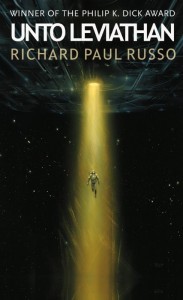
Normally I enjoy ark ship along with Big Dumb Object (BDO) tales and this one has both. In many ways I did like Unto Leviathan, the mysteries on the planet Antioch and the strange, apparently lifeless alien spaceship as told through Bartolemeo. He’s a strong character with bionic limbs and whose closest friends, the Captain and Pars, another oddity, are of similar age, experience, voice and desires – as if three aspects of one. Bartolemeo has a love interest too in the Bishop’s right-hand woman, Veronica. Sadly it is platonic but it all adds to the mystery. For me there’s too much religion in this adventure, and that in spite of the atheism declared by most of the main characters including the Bishop! We have the stereotype that all aliens are evil and malicious, and for me there’s no satisfactory ending nor solutions to many of the conflicts. Spoiler: interesting that the alien ship sprouted tentacle-like arms much like the Cthulhu creature of Lovecraft dark fantasy and a kind of match for the biblical and in this case eponymous Leviathan.
There are few turns of phrase I wish I’d written. One is “a dark, mental creature of doubt.” Don’t we all have those? Lovely. A page-turner for those yearning for deep space travel.
Nelder News
 Just finished the first draft of a hard science fiction story to be submitted to Rosie Oliver for a Sferics Anthology. My story, Angular Size, plays with our perception of size. The Moon, for example, is smaller than the size of our tiniest coin when held at arm’s length. That apparent size is know as Angular Size. What if an object slid into view alongside the Moon that appeared to be the same angular size but in fact that was its real size – ie a tiny coin. How could that work? How would people respond? The story is being treated to critique at the British Science Fiction Association (BSFA) Orbiters currently. I had problems because in my early draft I had religious zealots and the Puerto Rican mafia Asociación Ñeta, or simply Ñeta, threatening the main character, while she works at the Arecibo Radio Telescope. However, that ran into way over the 9,000 word limit so much to lose.
Just finished the first draft of a hard science fiction story to be submitted to Rosie Oliver for a Sferics Anthology. My story, Angular Size, plays with our perception of size. The Moon, for example, is smaller than the size of our tiniest coin when held at arm’s length. That apparent size is know as Angular Size. What if an object slid into view alongside the Moon that appeared to be the same angular size but in fact that was its real size – ie a tiny coin. How could that work? How would people respond? The story is being treated to critique at the British Science Fiction Association (BSFA) Orbiters currently. I had problems because in my early draft I had religious zealots and the Puerto Rican mafia Asociación Ñeta, or simply Ñeta, threatening the main character, while she works at the Arecibo Radio Telescope. However, that ran into way over the 9,000 word limit so much to lose.
Meanwhile two of my short stories, Blue Ice and The Examination have been accepted for a Rave Soup Anthology to be published any minute. I’ve sent a paper version of my children’s illustrated fiction, String Theory to a publisher Fledging Press in Edinburgh. All digits crossed they love it enough. (Not loving it enough has become the #1 cliché reason for rejection). Xaghra’s Revenge – a paranormal / historical fantasy has been sent to Pendragon Press for consideration.
Up to the winter solstice and Christmas. Seeking an epic escape from humdrummery? Get lost in this post-apocalyptic gem, 
ARIA smarturl.it/1fexhs that’s the Kindle link.
Paperback Amazon.com http://www.amazon.com/ARIA-Left-Luggage-Volume-1/dp/1905091958/
Paperback UK http://www.amazon.co.uk/ARIA-Left-Luggage-Geoff-Nelder/dp/1905091958/
Publisher’s website with more details and formats. http://www.ll-publications.com/leftluggage.html
Buy it quick before you run out of memory!
You tube video trailer
Fancy a short horror set in the warm Malta waters? Voyage of the Silents
One of my wife’s colleagues ran into a container. Clarify Nelder. Okay, he was sailing to the Isle of Man and the container had fallen off a ship. To a writer of spooky stories this is a rich start to a horror story. What’s in the container? Surely not people, yes but what kind of people… It’s called Voyage of the Silents, published by Pennyshorts for less than a cup of tea
Links to buy ARIA and other of my books are on my Amazon author page
Geoff’s UK Amazon author page http://www.amazon.co.uk/Geoff-Nelder/e/B002BMB2XY
And for US readers http://www.amazon.com/Geoff-Nelder/e/B002BMB2XY
Geoff facebooks at http://www.facebook.com/AriaTrilogy and tweets at @geoffnelder
http://nelderaria.wikia.com/wiki/NelderAria_Wiki
The post #Review Unto Leviathan appeared first on Geoff Nelder - Science Fiction Writer.
November 27, 2015
Forgotten it already!
Walking home from grandson’s school I stopped at a huge, old oak tree and said to him. Oliver, absorb this moment. Look at everything, smells, touch of this oak bark –  everything. Then remember it tonight as you lie in bed, then tomorrow, and each year as you get older remember this moment. This is how you can enrich your life. Will you try and do that?
everything. Then remember it tonight as you lie in bed, then tomorrow, and each year as you get older remember this moment. This is how you can enrich your life. Will you try and do that?
He ran off with a stick shouting back, “Forgotten it already!”
Yep, he’s six and already a windup merchant. He’s also thoughtful and will probably remember.
I did it because my dad did it to me, except it was a crumbling red brick wall at a bus stop in Cheltenham. He was an artist and thus sensitive to observation and environment. Alerted me to the microworlds that exist in a crack or in a mossy lump in the mortar. Then now and then he’d say, ‘Remember that wall.’ Every now and then I’d find myself appreciating a ray of sunlight or comfort of an armchair and wondering if I’ll remember this moment next week, next year. I always do even if I forget what I came to town for.
I used that brick wall moment in ARIA: Left Luggage. A keeper at Chester Zoo has caught the infectious amnesia virus, but his intelligence still works:
“Lester Godwin pushed the security buttons gleaming at him from the staff entrance of Chester Zoo. Sandstone blocks formed the gate, their rosy hue harbouring tiny red mites and ants in gravity-defying scurrying. They darted around shiny green-leaved stonecrop plants with their shocking-pink flowers. A miniature zoo for those who couldn’t afford the entrance fee of the real one. He once led a puzzled school biology class out of the zoo and made the students count the species of fauna in this old wall. Although the kids were gob-smacked at the micro ecosystem, they still preferred to see elephants.”
From ARIA: LEFT LUGGAGE
Hopefully, Oliver will remember and revisit the odd places nuances of the world I point out to him. I think he and my other grandkids will.
 Here’s Oliver in another part of Davyhulme Park, Manchester. I didn’t intend this blog post to be a sell for ARIA but just in case you are interested:
Here’s Oliver in another part of Davyhulme Park, Manchester. I didn’t intend this blog post to be a sell for ARIA but just in case you are interested:
It won the P&E Readers Poll for best SF novel in 2012 and the links are
Kindle – Amazon.com http://www.amazon.com/ARIA-Left-Luggage-ebook/dp/B008RADGYC/
Paperback Amazon.com http://www.amazon.com/ARIA-Left-Luggage-Volume-1/dp/1905091958/
Kindle – UK – http://www.amazon.co.uk/ARIA-Left-Luggage-ebook/dp/B008RADGYC/
Paperback UK http://www.amazon.co.uk/ARIA-Left-Luggage-Geoff-Nelder/dp/1905091958/
Publisher’s website with more details and formats. http://www.ll-publications.com/leftluggage.html
You tube video trailer http://youtu.be/oh0AAXIe8VU
facebook page http://www.facebook.com/AriaTrilogy
The post Forgotten it already! appeared first on Geoff Nelder - Science Fiction Writer.
October 20, 2015
Is it Science Fiction?
Is it Science Fiction?
The word fantastic can mean ‘out of this world’. One difference between science fiction and fantasy is that with the former, you can theoretically get there from here.
Some say it isn’t SF if the story is only using the future or alt-history as a setting and not crucial to the story – eg Margaret Atwood’s The Handmaid’s Tale?
I am an admirer of Margaret Atwood and her fiction. Sometimes she can be too eager to thrust environmentally-friendly subtext at us, and her narrative in-jokes do not always hit my peculiar funny bone, but her life-stretching characters and literary prowess are a joy. I was in denial a few years ago when told by my local book group that Atwood does not want her fiction to be regarded as science fiction. Oryx and Crake she described as ‘adventure romance’. Let’s think about this. A dystopian fiction taking genetically modified people beyond current capabilities. I would say that kind of premise is definitely science fiction.
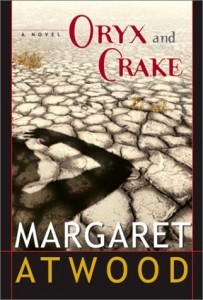 One of the best aspects of science fiction is its defiance of rigid definitions. Early works were hard science fiction where robots, rockets and flying saucers invaded Earth or used to explore space. Time travel, faster-than-light and aliens were all around in H.G. Wells and Jules Verne and considered as science fiction. Where we have giant and miniature humans as in Jonathan Swift’s Gulliver’s Travels (1725, again in 1735) then we are in fantasy. Not that he thought much about genre. If anything Swift considered his masterpiece to be a parody of the growing middle-class fashion of reading travellers’ tales as well as a satire on people’s foibles. Vampire tales kicked off by Bram Stoker in Dracula (1897) are fantasy because no amount of reasonable projection of current knowledge would create a vampire. It’s easy to classify pixies, dungeons & dragons, and goblins as fantasy – beyond scientific knowledge. Many tales are borderline. Mary Shelley’s Frankenstein (1818 / 1831) is well within current knowledge, give or take a transplant and a defibrillator; hence it is science fiction.
One of the best aspects of science fiction is its defiance of rigid definitions. Early works were hard science fiction where robots, rockets and flying saucers invaded Earth or used to explore space. Time travel, faster-than-light and aliens were all around in H.G. Wells and Jules Verne and considered as science fiction. Where we have giant and miniature humans as in Jonathan Swift’s Gulliver’s Travels (1725, again in 1735) then we are in fantasy. Not that he thought much about genre. If anything Swift considered his masterpiece to be a parody of the growing middle-class fashion of reading travellers’ tales as well as a satire on people’s foibles. Vampire tales kicked off by Bram Stoker in Dracula (1897) are fantasy because no amount of reasonable projection of current knowledge would create a vampire. It’s easy to classify pixies, dungeons & dragons, and goblins as fantasy – beyond scientific knowledge. Many tales are borderline. Mary Shelley’s Frankenstein (1818 / 1831) is well within current knowledge, give or take a transplant and a defibrillator; hence it is science fiction.
As a rough guide science fiction could be said to be fiction, which stretches current knowledge. Fantasy is pure imagination.
I confess to kick against prescriptive definitions. For example Theodore Sturgeon (most famous novel being the excellent More Than Human [1953] based on six extraordinary people who could merge as a superhuman) wrote: “A good science-fiction story is a story about human beings, with a human problem, and a human solution, that would not have happened at all without its science content.” I hope he didn’t mean to sound like an arrogant banner-waving human-centric where no other species matters. Having said that I can’t think of a major science fiction story that doesn’t have human, or hominoids, as main characters. Maybe I should write one.
Before I leave him there is Sturgeon’s Law: “Ninety percent of science fiction is crud, but then, ninety percent of everything is crud.” No arguments there.
Robert Blevins publisher of Adventure Books of Seattle favours Rod Serling of Twilight Zone fame, who once said: ‘Fantasy is the impossible made probable. Science fiction is the improbable made possible…’
I also like Tom Shippey’s definition of science fiction: “Science fiction is hard to define because it is the literature of change and it changes while you are trying to define it.” That bit about change is significant. The huge element of ‘what if’ makes exciting fiction. What if gravity was random in strength and direction? What if time varied with height?
Back to Margaret. This all kicked off again because of her work, The Year of the Flood (Bloomsbury, 2009). It is a sequel to Oryx and Crake, and like her other works explores human GM possibilities with a mix of satire, humour and is great literature. Sadly, she instructs readers not to count it as science fiction. In her essay collection, Moving Targets, she says that everything she writes is possible and so is not science fiction. I’m sorry, Margaret, but your definition remains yours and if I admire your work as science fiction then I will. I can only guess that she has fallen victim of the snobbery in the literati. The point is to ensure our science fiction is literature, not to be in denial.
Nelder News
Voyage of the Silents is a new story published recently and it will only cost you 50p (80 cents) or less than the biscotti for your coffee.
One of my wife’s colleagues ran into a container. Clarify Nelder. Okay, he was sailing to the Isle of Man and the container had fallen off a ship. To a writer of spooky stories this is a rich start to a horror story. What’s in the container? Surely not people, yes but what kind of people… It’s calledVoyage of the Silents, published by Pennyshorts
To grab a copy of one of my ARIA books here are the links
Kindle – Amazon.comhttp://www.amazon.com/ARIA-Left-Luggage-ebook/dp/B008RADGYC/
Paperback Amazon.comhttp://www.amazon.com/ARIA-Left-Luggage-Volume-1/dp/1905091958/
Kindle UK –http://www.amazon.co.uk/ARIA-Left-Luggage-ebook/dp/B008RADGYC/
Paperback UKhttp://www.amazon.co.uk/ARIA-Left-Luggage-Geoff-Nelder/dp/1905091958/
Publisher’s website with more details and formats.
http://www.ll-publications.com/leftluggage.html
Buy it quick before you run out of memory
Another science fiction book you might like of mine uses a bit of quantum mechanics but in a fun way. EXIT, PURSUED BY A BEE After timequakes cause chaos, a Mars mission is diverted to chase departing mysterious spheres. Will the spheres listen and return before Earth rips apart?
Check out the page with video clips and purchase linkshttp://geoffnelder.com/project/exit-pursued-by-a-bee/
The post Is it Science Fiction? appeared first on Geoff Nelder - Science Fiction Writer.
October 13, 2015
Crazy Interview
Interesting afternoon here in Geoff Nelder’s home. I, Doctor Antonio Menzies, escaped from the pages of the ARIA Trilogy to be interviewed by Jeremy Croston for his blog. I held back some information not wanting to scare you mere mortals but it was bella all the same. So sip a glass of Chianti with your pizza and read his piece here

Mad Dr Antonio (me!)
The post Crazy Interview appeared first on Geoff Nelder - Science Fiction Writer.
October 11, 2015
The Martian review (book & film)
The Martian by Andy Weir (2011)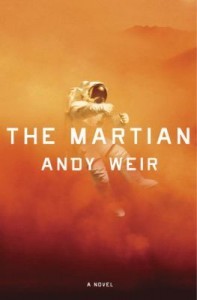
Notes
Like many science fiction readers and writers, I am fascinated by all things Mars. We read and watch every Mars-related item we can. It doesn’t make us experts because the more we know, the more we realise how little we know.
The book’s main theme is survival on both an engineering / science level and as a human. On a Mars mission, a stronger-than-expected dust storm blows satellite dishes into Mark Watney who is impaled on an antenna and knocked into a dune. His bio signs report flat-lining because of the antenna but his congealing / freezing blood and his falling on top of his suit tear, saves his life although the crew believe him dead. If they spent time to check on him, the Mars Ascent Vehicle (MAV) would tip completely over and possibly damaged beyond repair so the crew takes off.
Mark survives, returns to the HAB and finds life support is fine. He is an engineer and botanist so is very capable of repairs and applies ingenuity in improvised DIY. The novel expertly takes the reader on his Mars road trips and although danger is ubiquitous in the near-vacuum atmosphere with its lack of magnetosphere enabling solar radiation to be lethal, he uses his graveside humour to get by.
Best quote: “My asshole is doing as much to keep me alive as my brain.”
I enjoyed this Martian set of road trips but while liking Mark I found I was increasingly annoyed by his jolly, clappyhands attitude to everything. Other silly annoyances are his habit of saying ‘Yay’ too often, making the narrative a bit too supercilious. He hasn’t realized that the telescopes on the many satellites in orbit have seen he’s survived, which is unlikely for someone so clever. He dismissed using the seeds for growing grass, beans and peas and concentrated solely on potatoes, which need much deeper soil. The legumes could have been grown in just water and he should have known that. His use of the Pathfinder probe for comms is ingenious but used in other books and films. His knowledge and the existence around him of more electronic parts than a Maplin superstore should have enabled him to make radio contact with a satellite / Hermes or Earth. The final use of a MAV that had to be stripped and go up to rendezvous with a recovery vehicle was done in the film The Red Planet (2006). Naturally, I am disappointed he found no Martian life, even underground / primitive / ghosts. The book read a bit like a survival guide, fun, adventurous and commended but might have benefitted from being more a complete story form if there had been two people or one and an AI so as to create more conflict and resolution in arguments, etc. In spite of these minor points I enjoyed The Martian and could have read it at twice the length.
Comparison notes with the film of The Martian (2015) directed by Ridley Scott and with Mark Watney played by Matt Damon.
Watching a film about Mars is the nearest thing any of us can get to being there. The film does a convincing job. With the benefit of actual Mars landers, film makers are able to draw on real-colour images and video to show what the landscape and sky looks like. All Ridley Scott had to do then was to take the camera crew and actors to Jordan and apply filters.
I enjoyed the film partly because Matt Damon played down the “Yay”s of the character in the book and more was made of the tension back in America and on Hermes so that the focus wasn’t so much on just Mark Watney as in the book. Having said that, we need the juxtaposition of loneliness and exhilaration of being the only person on a whole planet that the book does rather better than the film. Why?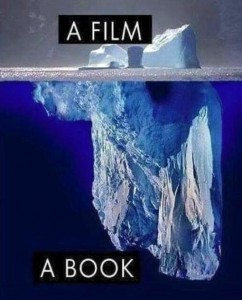 Because the film has to convey the story in just over two hours while the book has 369 pages. It is this picture floating around the internet lately. Appropriate given the recent discovery of liquid water (as brine) on Mars in addition to the ice at the poles and probably under the surface already known.
Because the film has to convey the story in just over two hours while the book has 369 pages. It is this picture floating around the internet lately. Appropriate given the recent discovery of liquid water (as brine) on Mars in addition to the ice at the poles and probably under the surface already known.
For example there is no mention in the film of the HAB’s inventory of stuff Mark could use such as the legumes and why he chose the potatoes instead.
Ironically for both the book and the film the critical windstorm at the beginning would not have been anything like as powerful in reality. The atmosphere on Mars is only 1% the density of the air on the surface of Earth. Yes there are winds, and the delightfully playful sand devils—harmless vortices of sand and grit, but the Martian windstorms are of higher velocity, on average. Even so you would only just feel the wind. It wouldn’t blow a lander over nor knock a satellite dish into Mark Watney.
Neither the book nor the film demonstrated the relatively low gravity on Mars, which is greater than the moon’s but less than half that of Earth. Mark would have hopped around more. Mars has no magnetosphere as Earth has (hence us seeing the Northern Lights) so solar radiation is much more intense there in spite of its distance. Impressive then that Mark survived over 500 days (sols, which are just longer than Earth days) with only a space suit to protect him on his days out of the HAB. Hopefully, NASA has solved that issue before astronauts are really sent there.
I had to laugh at the impression given that gravity assist slingshots around planets was invented by an intern at NASA in the future when it’s already been done many times.
Mark Watney was wrong, there was another human on his own on Mars – ever see the film Robinson Crusoe on Mars (1964)?
I can recommend you see the film The Martian, but the book is better.
Nelder News
Witness my own attempts to apply science to fiction in
The post The Martian review (book & film) appeared first on Geoff Nelder - Science Fiction Writer.
October 10, 2015
World’s End
World’s End

Above Minera looking south towards World’s End
Geoff Nelder © 2004
You would have laughed, anyone would. They certainly did. The black lycra shorts; the primary colours in the close fitted shirt; the polycarbonate helmet that when it rained wet his hair in stripes. The laugh was that he was pushing his Dawes tourer instead of riding it, in spite of twenty-four gears.
The rush of air passing him wasn’t a sudden veer in the southwesterly wind but a peloton of the local cycling club. Yes they nodded and called monosyllabic encouragements as they ought but Bryan could feel rather than hear their derision. He was sufficiently embarrassed to remount as soon as the incline decreased. He was out of condition, too lazy, too heavy and ashamed.
A lone ragged hawthorn framed the mist-capped Cyrn-y-Brain mountain, the view giving Bryan the excuse to dismount again. The lane wound round the tree and then down towards a hairpin bend known as World’s End. He saw the yellow splash of the riders whipping round another bend a mile away. As the epitome of strength and endurance disappeared, Bryan swallowed two mouthfuls of isotonic sports drink. The label promised him an instant boost of glycogen to his muscles. His legs should go like egg-beaters but he was taking no chances: the rest of his journey was downhill.
His hands gripped the drop handlebars. There was a fine balance between the psychological need for speed with head down and preparation for disaster with open-fingered gloves ready on the brakes.
On the way up, the effort of climbing the steep lanes made him wonder why he bothered. On the way down, the freewheeling and rush of wind in his face told him why.
Another lean into a bend. A few stones fly sideways squeezed by high pressure tyres humming on the grey tarmac. He couldn’t hear the slosh of the remaining drink in its bottle.
He would lift his head now and then, automatically memorise important detail such as imminent potholes and bends. A weasel stopped mid-scurry and dived for the sanctuary of the heather as Bryan called a “Hi.”
This was it. What it was all about: clean air, being higher than your house and high on exhilaration. The lane meandered round another moorland bend and became narrower.
The potholes increased in frequency and the surface changed from tarmac to compacted gravel forcing him to slow down. He didn’t remember the road being like this. The whole road from Minera to Llangollen was narrow but properly surfaced. He must have followed his wheel’s inclination to take the path of least resistance and went straight on when the proper road bent to the right. Navigation was sometimes a casualty of downhill head-down flight. He dismounted near a large rock. He stood on the stone to look back. He could see the familiar purple-heathered morphology of the moors, Cyrn-y-Brain topping the other side of the valley to the west but not the lane. You could be a hundred miles from anywhere up here. It was another reason why he liked it so much. There was unpretentiousness in the austere beauty. Of course humans had influenced the landscape but it was as close to nature as it could get.
“Ah well, backtrack it is boys,” he said to himself. He remounted but the path was rougher than it seemed a few minutes before and he frowned.
“If I wanted to go off-road I would’ve brought my mountain bike.”
He pushed the bike over the rough path fully expecting to find the smoother lane any moment. It didn’t happen. The path became a track and petered out altogether.
“What’s wrong with me?” He rarely made sober navigational errors. He stretched up looking west. The skyline was as he remembered. By pushing and carrying his bike towards the distinctive peak of Cyrn-y-Brain he should intercept the road.
After ten minutes he leant his bike against a boulder then bog-hopped across tufts of cotton-grass and bright green sphagnum moss. His nose twitched with the wet earthy aroma. He tripped and dived headlong down the convex slope.
“This is ridiculous,” he cried out loud, frightening off a Golden Plover warbling its koo-eeing as it took flight warning other inhabitants of the approach of a madman. Bryan stopped to admire the plumage and take stock. If he continued down this awkward slope he would get bogged down in the tributaries to the Eglwyseg River. He must have missed the lane. Maybe the track he wrongly took was to the right of the main lane and not the left as he supposed. In which case he had to backtrack up hill and head east.
He clambered on top of another large rock to look southwest. Ever since he first cycled on this route over twenty years ago, the rusty remains of a car decayed in the valley bottom. He’d often looked at it from the road as it contoured above, wondering what had happened. Perhaps it was just a dumped wreck but maybe it was full of revellers who, like him, took a wrong turning. He couldn’t see it. It might have been removed or he was not quite in the right place. Shaking his head he trudged back up the moorland slope.
His Shimano cycling trainers were now soaked and pungent mud splashed up his legs to match the colour of his shorts. Luckily, the bike was not too heavy. He was expecting to have lunch in Llangollen and be home before dusk. Even so it was a labour made worse by the thought of the downhill all the way to tea and chips if only he hadn’t gone wrong. But where? Again he stopped to survey the landscape, losing some of its magnificence as worry crept in. He could see no sign of a road or even of any track.
He knew he had to come across the road by continuing up the hill even if he had to go all the way to the summit of Esclusham Mountain. It was only another mile at the most. He returned to the rock with his bike and patted the saddle.
“I’ll be back.”
He frowned all the way picking his way in between gorse, blackthorn, cotton-grass and emerald bog-moss.
He knew he’d reached the top because he’d started descending. Where was the concrete trig point? It used to mark the summit. He shielded his eyes from the sun to take comfort from seeing signs of civilisation to the east and north. He should be able to see Minera village only a mile away, even Wrexham was only three or four. Nothing. There was an obscuring haze so that was probably why. No evidence that Nature had been tamed, trampled on or converted. He shook his head again. The summit to this hill is a bit of a ridge and he must have hit the wrong end to find the cairn.
He was relieved to see his bike taking a breather by the boulder. “Come with me,” he told it as he shouldered it to go cross-country downhill due south towards the sun. He had to hit the little dead-end limestone gorge of World’s End and Eglwyseg.
All the way, getting wetter, muddier and more tired he mocked himself since the lane must be just a few hundred yards to his right – or left. He was not going to be distracted by trying to find it though and lolloped on. As he entered the tree-line the way became steeper and more treacherous making him wonder more. The lane should hug the limestone escarpment around where he was. The road engineers centuries before had to level part of the slope but he couldn’t find it. He was sure he should have met fences but there was none.
He fell into a boulder-strewn stream. He laughed as he thought he recognised it. Although the hydrological dynamics of erosion meant the stream was constantly changing, the type of rocks, its size, the incredibly clear water added up to the World’s End stream. All he had to do was follow it. It should be forded by the road at World’s End and bridged farther downstream. He was very fond of the cul-de-sac gorge so swapping the bike from his sore right shoulder to the left he stomped and splashed upstream.
Twenty minutes later he was in no doubt of two facts. He was definitely sitting down on a limestone scree-slope at World’s End and he must have lost his marbles. He walked around where the road should be and waved his arms around where a stout wooden fence and stile should have stopped him.
“I’ve got it. I’ve gone back in time!” he shouted, defying anyone to contradict him. “But how far back?”
He knew the lead-ore was worked for centuries in the area and that the caves at World’s End were worked in early medieval days, maybe Roman. Yes, the caves were there and what might have been grown-over spoil heaps. He was troubled by the lack of any artefacts. He’d hoped to see rails or timber supports. These workings could just as well have been natural limestone caves. Did that mean he was back before the Romans? Was he going to find that racing-cycling group equally bewildered carrying their bikes through the trees? Maybe their collective exuberance activated a time-warp.
He sat where the stile should have been and finished off his energy drink. He refilled the bottle from the stream.
“I could go back to Minera and hopefully travel through the time gate or whatever,” he said to the pied wagtail on the other side of the stream. “But it would be mostly downhill to Llangollen either alongside the stream or contouring the escarpment. I know a great footpath along there. Or I did.” The bird wagged its tail.
“Oh come on. One wag for yes and two for no. Right, shall I follow the stream? No. I agree. It could get difficult access. Tell you what, bird. Will you look after my bike while I go to Llangollen and make some sense of all this? You will? Great.”
He opened the pannier and took a packet of trailmix he always carried for emergencies.
“Bye then. Hope I don’t come across Romans: they’d think I look really odd. On the other hand, imagine having modern knowledge back in Roman times – I’m going to make a fortune! I know how to make whisky and ice-cream.”
As he climbed up the slope to the scree that should take him to Llangollen, the bird took off to follow. It hadn’t been perched on a stone. It was a dusty can of Cola. If Bryan had been more observant he would have read,
“Best before 5:10:3034”
Nelder News
A new story published recently and it will only cost you 50p (80 cents) or less than the biscotti for your coffee.
One of my wife’s colleagues ran into a container. Clarify Nelder. Okay, he was sailing to the Isle of Man and the container had fallen off a ship. To a writer of spooky stories this is a rich start to a horror story. What’s in the container? Surely not people, yes but what kind of people… It’s calledVoyage of the Silents, published by Pennyshorts
To grab a copy of one of my ARIA books here are the links
Kindle – Amazon.comhttp://www.amazon.com/ARIA-Left-Luggage-ebook/dp/B008RADGYC/
Paperback Amazon.comhttp://www.amazon.com/ARIA-Left-Luggage-Volume-1/dp/1905091958/
Kindle UK –http://www.amazon.co.uk/ARIA-Left-Luggage-ebook/dp/B008RADGYC/
Paperback UKhttp://www.amazon.co.uk/ARIA-Left-Luggage-Geoff-Nelder/dp/1905091958/
Publisher’s website with more details and formats.
http://www.ll-publications.com/leftluggage.html
Buy it quick before you run out of memory
Another science fiction book you might like of mine uses a bit of quantum mechanics but in a fun way. EXIT, PURSUED BY A BEE After timequakes cause chaos, a Mars mission is diverted to chase departing mysterious spheres. Will the spheres listen and return before Earth rips apart?
Check out the page with video clips and purchase linkshttp://geoffnelder.com/project/exit-pursued-by-a-bee/
The post World’s End appeared first on Geoff Nelder - Science Fiction Writer.


